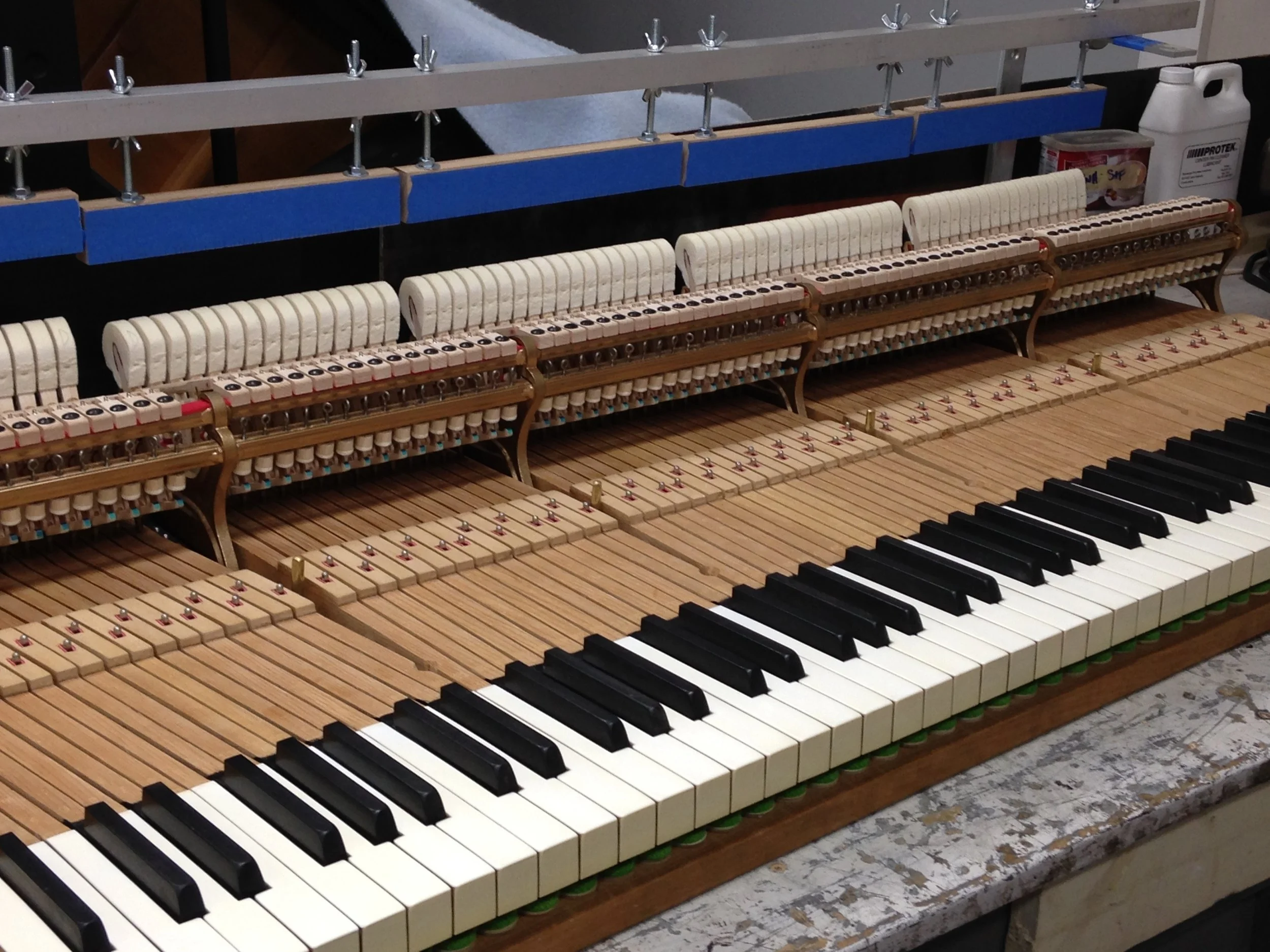Your piano is an investment, and as such, it should be maintained with the utmost care. Regular servicing by a qualified technician will preserve your instrument and help you avoid costly repairs in the future.
Because your piano contains materials such as wood and felt, it is subject to change depending on its environment. Extreme temperature and humidity fluctuations will cause its materials to swell and contract, affecting tone, pitch, and action response or touch. You can reduce the severity of these effects by placing your piano near a wall away from windows or doors that are opened frequently. Avoid heating and air conditioning vents, fireplaces and areas which receive direct sunlight. Your piano will perform best under consistent conditions neither too wet nor dry, optimally at a temperature of 68 degrees F and 42 percent relative humidity.
Tuning
How often you choose to have your piano tuned depends on your personal preference and how often your piano is played. Your piano was designed and built so that under normal use and conditions, it should need only periodic tuning. Many of our customers have their piano tuned once or twice a year, some request three or four tunings a year.
To put the matter of tuning into perspective, most concert pianos are tuned before every rehearsal and before every performance. In professional recording studios, the piano is tuned three or four times each week as a matter of course. Steinway & Sons for example, recommends that a piano should be tuned three or four times a year. However, you should have the piano tuned as often as you think necessary.
Tuning is an art practiced by skilled professionals and under no circumstances should anyone other than an experienced professional be allowed to tune your piano.
Voicing (Tone Regulation)
Voicing is the adjustment of a piano's tone or quality of sound and is, to some extent, a matter of preference. Some prefer a "bright" sound while others prefer a mellow sound. Whatever your preference, every piano will acquire a somewhat brighter tone with time, because the hammer felts will be compacted as they are thrown against the strings.
Action Regulation
Despite regular tuning, you may notice a deterioration of your piano's performance over time. It's important to note that tuning is only the adjustment of the system of strings and pins that determines the pitch of each string. Your piano also requires a periodic servicing called regulation. This involves adjusting the mechanical aspects of the piano to compensate for the effects of wear, the compacting and settling of felt, as well as dimensional changes in the wood parts due to changes in humidity.
Do the keys feel too heavy or too light? What about the repetition? Is it sluggish? Do the keys feel like they don't stay underneath your fingers, in that you lose control? Is the action uneven? Action regulation can resolve these issues.
Contact John Butler, RPT today to schedule an appointment for your piano to be serviced
301.262.1595 | butlerandsonspiano@gmail.com
Repairs and Restoration
Most pianos can be played for many years without major repairs. However, the tone, touch, and appearance will continually decline with age. When regular maintenance such as cleaning, regulating, voicing, and tuning can no longer provide satisfactory performance, a piano may require reconditioning or rebuilding.
Exactly when a piano needs rebuilding or reconditioning depends on its original quality, the climate, usage, and performance requirements. One piano may need rebuilding after just twenty years, while another may need only reconditioning after fifty years.
There are many factors involved when deciding whether to invest in the expense of reconditioning or rebuilding your piano. During our consultation, we will consider the following factors:
The overall condition of the piano. Can it really be restored to original condition or is it deteriorated beyond repair? Pianos subjected to severe fire, flood, or moving damage may not be repairable.
The quality, size, and type of the piano. Low priced, small pianos of poor design have limited potential. If the rebuilt piano would not be capable of meeting your performance needs, it would be better to replace it with one of better design.
The cost of repairs versus replacement. Major repairs may exceed the value of small low-quality pianos. However, most large high-quality instruments can be rebuilt for one-half to two-thirds the cost of a comparable new piano, making rebuilding a cost-effective option for fine pianos.
Sentimental value. Personal attachment or historical value may justify investing in major repairs rather than replacement.
After your piano has been inspected, we will provide you with a written contract proposal detailing what will be needed to return your piano to its maximum performance capability. This will include a 5 year warranty for the rebuilding work - although your restored piano will maintain its value for another generation.
Contact John Butler, RPT today to schedule an appointment
301.262.1595 | butlerandsonspiano@gmail.com
